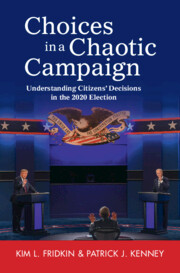Book contents
- Choices in a Chaotic Campaign
- Choices in a Chaotic Campaign
- Copyright page
- Dedication
- Contents
- Figures
- Tables
- Preface
- 1 Understanding How Campaigns Matter
- 2 “A Hot Mess inside a Dumpster Fire inside a Train Wreck”
- 3 The Priming of COVID-19 during the Campaign
- 4 Protests against Police Brutality
- 5 “A Rigged Election”
- 6 How the Campaign Shapes Voters’ Decisions about the Candidates
- 7 The Impact of Campaign Messages on the Decision to Vote
- 8 How Campaign 2020 Matters
- Appendix Survey Questionnaire
- References
- Index
3 - The Priming of COVID-19 during the Campaign
The Consequences of Trump’s Coronavirus Diagnosis
Published online by Cambridge University Press: 16 May 2024
- Choices in a Chaotic Campaign
- Choices in a Chaotic Campaign
- Copyright page
- Dedication
- Contents
- Figures
- Tables
- Preface
- 1 Understanding How Campaigns Matter
- 2 “A Hot Mess inside a Dumpster Fire inside a Train Wreck”
- 3 The Priming of COVID-19 during the Campaign
- 4 Protests against Police Brutality
- 5 “A Rigged Election”
- 6 How the Campaign Shapes Voters’ Decisions about the Candidates
- 7 The Impact of Campaign Messages on the Decision to Vote
- 8 How Campaign 2020 Matters
- Appendix Survey Questionnaire
- References
- Index
Summary
The 2020 presidential campaign occurred in the midst of the first worldwide pandemic in 100 years. The pandemic engulfed the United States for the entire length of the campaign and the incumbent president was hospitalized with the virus at the height of the fall campaign. In this chapter, we show that people’s concern about the coronavirus pandemic increased significantly after Trump contracted COVID-19. Furthermore, and consistent with the citizen-centered theory of campaigns, we find that psychological predispositions, along with political and demographic characteristics, substantively and significantly predict changes in worry about the coronavirus from September to October. For instance, people high in authoritarianism and conflict avoidance become significantly more worried about the coronavirus pandemic from September to October. Finally, we show that people are more likely to consider assessments of the candidates’ competence for dealing with the coronavirus when developing overall evaluations of the candidates in October – after Trump’s COVID-19 diagnosis – compared to September.
Keywords
- Type
- Chapter
- Information
- Choices in a Chaotic CampaignUnderstanding Citizens' Decisions in the 2020 Election, pp. 63 - 91Publisher: Cambridge University PressPrint publication year: 2024

